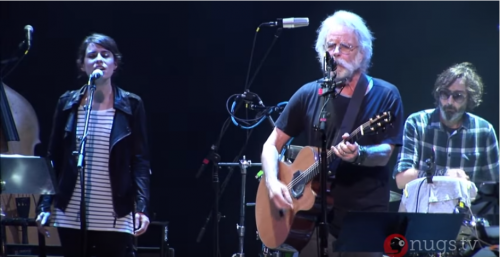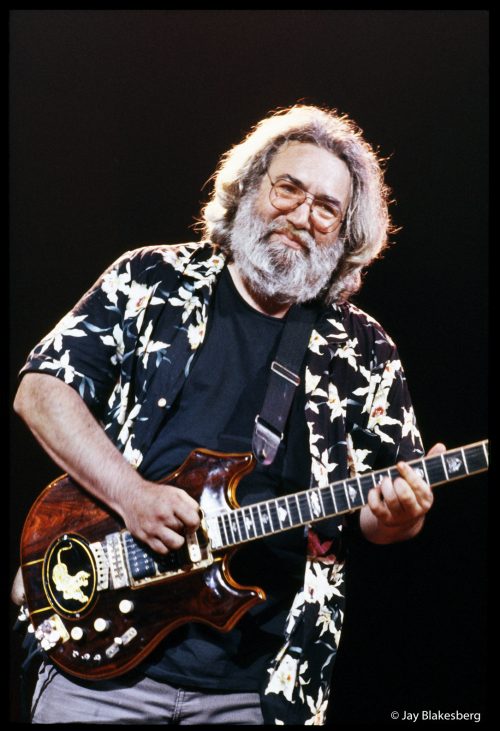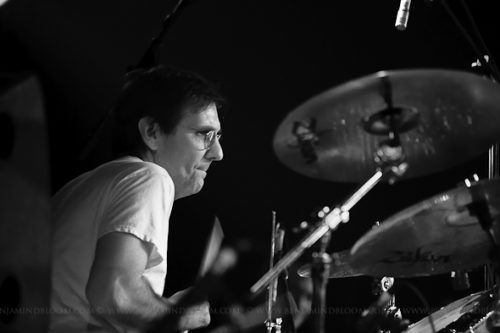PORT CHESTER, N.Y. — Sometimes one needs to look back to move forward. Such is the case with Bob Weir, the legendary Grateful Dead co-frontman.
Fresh off a hugely successful, nostalgic summer tour with former band members plus John Mayer as Dead and Company, Weir this fall released “Blue Mountain,” his first solo album since 1978, and embarked on the “Campfire Tour” to promote it. For the album, Weir spun back more than 50 years for inspiration, to a pre-Grateful Dead teenage summer as a ranch hand in Wyoming, crafting cowboy tunes that predate the rock and folk traditions as we know them.
That accounts for the looking back. But to move forward, Weir has enlisted some surprising partners from outside his immediate musical circle: a cadre of indie rock musicians 30 years his junior, give or take. The cohesive, dynamic results both on the album and on the stage, as witnessed last Sunday at The Capitol Theatre in Port Chester, N.Y., show a musician reaching for something new. It’s a remarkable and humbling thing to witness, this white-haired sage staring at 70 challenging himself, letting himself be pushed and prodded by these whippersnappers.
Weir took the stage alone, launching into a surprise solo acoustic opener of “One More Saturday Night.” No one in the crowd seemed to mind that it was Sunday. The old-school rock tune lost none of its energy despite its scaled-down delivery. With the audience now properly primed, Weir took the energy level down a notch for beautiful deliveries of a pair of long-time Dead covers: the lilting traditional folk tune “Peggy-O” and Bob Dylan’s “When I Paint My Masterpiece,” which Weir has made his own for decades.
[Scroll down for setlist and complete video of the show.]
Following one more solo selection — the title track from “Blue Mountain,” played with a quiet intensity and the warmth of a campfire storyteller — Weir’s band emerged for the rest of the first set. A collective of musicians whose roots are in the indie rock and folk scene, rather than the jam band scene Weir helped found, the ensemble was more about space, pacing and layering than dizzying instrumental excursions. As they did on their first song together Sunday, the elegiac album-closer “One More River to Cross,” new Weir sidekick Josh Kaufman played deliberate, piercing, echoing electric guitar, as longtime Weir associate Steve Kimock chimed in with beautifully fragile, yet distinctive, lead lines of his own. All evening, Kaufman and Kimock played off each other with remarkable synergy and sympathy. Three female background singers — The Bandanna Splits — added to the song’s eerie, resigned-to-death quality with their plain-spoken deliveries, while the taut, sometimes powerful and sometimes delicate rhythm section of Bryan (drums) and Scott Devendorf (bass), of the indie band The National, held down the bottom end.
The rest of the opening set focused primarily on “Blue Mountain.” “Darkest Hour,” despite its subject matter, was light and uplifting, helped along by the Bandanna Splits; “Lay My Lily Down,” a tale told by a grieving father burying his daughter, was predictably dark; and “Ghost Towns” was so wide-open and airy, you could almost picture the tumbleweeds blowing through said towns. If anyone in the crowd was not familiar with the new material, Weir pulled them back in when he and his comrades launched into Jimmie Skinner’s “Dark Hollow,” and they, along with guest singer Leslie Mendelson, made it sound every bit as good as the version on the Dead’s live 1980 acoustic album “Reckoning.” Kimock’s lyrical, linear solo was delightful. Weir and company closed out the first half of the concert with “Gonesville,” a rockabilly tune from the new record and one of the more fun tunes on it.
Sunday’s second set, as has been the format for Weir’s short “Campfire Tour,” was made up entirely of Grateful Dead songs, either original or covers. Following an upbeat reading of Merle Haggard’s “Mama Tried,” the group slid into the late-’80s Dead tune “West L.A. Fadeaway.” Even as recently as this summer in Dead and Company, this song is typically played as a thick funk-rock number, but remarkably Weir and his new friends have turned “West L.A.” into a sparse, foggy, layered number. Here, and at many points during the show, as well as on the new album, one couldn’t help but draw parallels between this sound and a pair of Bob Dylan’s albums: “Oh Mercy” and “Time Out of Mind.” Kimock on pedal steel and multi-instrumentalist Jon Shaw on organ provided the smoky foundation, while Kaufman plucked out the lead and Weir, as well as Aaron Dessner, also of The National, fleshed out the song with layers of acoustic guitar. Bryan Devendorf, as he did all evening, played a simple drum kit, using brushes rather than sticks and other muffling techniques, creating a key aspect of the band’s ethereal sound.
“Eyes of the World” followed the same structure as the Dead original, but due to the players’ own musical personalities and the instrumentation, this “Eyes” sounded fresh. During one breathtaking segment, Kaufman and Weir faced off at center stage, Kaufman playing a glorious, spiraling lead while Weir strummed out the jazzy rhythm. Underneath, Dessner plucked out a tight, percussive pattern on electric guitar. During a latter portion of the tune, it was Kimock’s turn to solo, with Dessner at his side providing musical support. Anyone who has followed the post-Grateful Dead scene knows of Kimock’s understated genius, and fans during the weekend’s New York City-area run were able to have their cake and eat it too, as Kimock, who along with Shaw joined the tour when Dessner dropped out due to personal reasons, got to witness all of the guitarists together (Dessner played these shows as a guest).
As “Eyes” faded into the ether, Weir shifted the band into the familiar and comfortable major chords of the Dead classic “Uncle John’s Band.” The feel-good, folk-rock ditty from the landmark “Workingman’s Dead” album was an understated singalong, complete with five-part harmonies: Weir, Mendelson and the three Bandanna Splits. Much like a Dead show, the second set featured a long, slow Jerry Garcia ballad, and serving that role Sunday was “Morning Dew.” (It’s also worth noting that besides the covers, all of the Dead songs the band performed on this night were originally sung by Garcia, not Weir, unless you count the tandem singing on the original “Uncle John’s Band.”) Weir was at his passionate best singing “Dew,” as the band, playing with a stubborn, deliberate sense of purpose, ratcheted up the intensity from verse to verse, matching their leader. There was was a quiet, directness to the song, the band de-crescendoing, forcing the audience to listen harder; it’s a dynamic trick you can’t pull off in a stadium or arena, but perfectly suited for the cozy Capitol, which holds less than 2,000.
After the emotionally draining “Dew,” the longtime Dead set-closer, Buddy Holly’s “Not Fade Away,” was a carefree, syncopated palate cleanser. Weir strapped on an electric guitar for the first time. After “Happy Birthday” was sung to Weir by band, crew and promoter Peter Shapiro, and he was gifted a black cowboy hat (and a bunch of similar hats were launched into the crowd ), the newly minted 69-year-old played a solo rendition of his new album’s “Ki-Yi Bossie,” a tune dripping with dry humor, before the similarly hatted band rejoined him for the “American Beauty” lullaby “Brokedown Palace,” The Bandanna Splits sweetening the deal on the lush choruses. It was a warm and fuzzy farewell on a night that was alternately dark and foreboding, familiar and welcoming.
Photo credit: YouTube/Nugsnet




Sounds like it was an excellent show. Wish I was there. One correction though, Uncle John’s Band was on Workingman’s Dead, not American Beauty.
Russ, thanks for your comment, and nice catch on that error. We’ve made the correction.
Thanks for the review and sharing the Nugs vid of the show!
Kudos on your review, Michael ! Insightful and well-written.